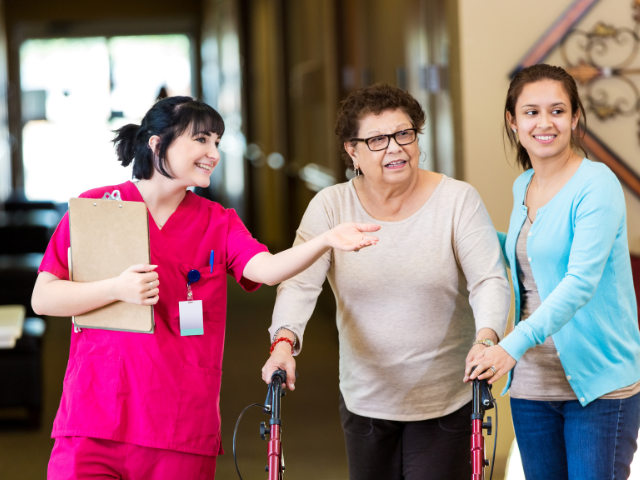Key Responsibilities of RNs in a Skilled Nursing Facility
Patient Assessment and Monitoring:
Upon admission to a SNF, the RN conducts a comprehensive head-to-toe assessment, examining the resident’s physical, mental, and overall health status. During the assessment, the RN records vitals, height and weight, mental status, and skin condition, which will be routinely monitored to detect any changes. This establishes a health baseline that guides the resident’s care throughout their stay.
The RN also acts as a liaison between family members and healthcare providers, ensuring that changes in the resident’s condition are promptly communicated and directives from physicians and nurse practitioners are accurately followed.
Care Planning and Coordination:
The RN’s role in care planning varies by facility, but all nurses working in a SNF collaborate with an interdisciplinary team that includes directors, administrators, physicians and their offices, and floor staff. They also ensure the care plan is followed accurately.
Medication Management and Administration:
Some SNFs require RNs to pass medications while simultaneously assessing and monitoring residents, but all RNs have a supervisory duty to ensure correct medication administration using the nursing process.
Generally, RNs work with a team of LPNs to complete medication administration. RNs ensure proper protocol is followed during medication administration and that physician orders are carried out accurately.
Wound Care and Infection Control:
LPNs, who are often educated by RNs, complete many wound dressings. Strong educational skills are necessary to ensure proper care delivery. However, RNs lead the pack when it comes to infection control. They are a source of education for staff members on how to properly execute infection control practices.
Enhancing Quality of Life and Patient Advocacy
Emotional and Psychological Support:
While SNFs can be a source of stress and emotional turmoil for residents, RNs provide day-to-day care of the physical and mental well-being for residents. RNs can offer direct support or provide on-the-spot education to other staff members on how to assist a resident with a difficult transition or other daily emotional and psychological issues. Soft skills are essential for this job duty.
Advocacy for Patient Rights and Autonomy:
RNs work as liaisons between family members, physicians, and residents. They should take into account the residents’ wishes and provide education to family members on their options (such as hospice, palliative care, surgical options, medications, etc.). RNs are often the direct line of communication between resident and physician and should communicate clearly the residents wishes.
Promoting Patient Independence and Rehabilitation Goals:
RNs work with an interdisciplinary team of physical and occupational therapy teams and reinforce teaching by the PT and OT to encourage maximum rehabilitation potential. The RNs educate certified nursing assistants (CNAs) to ensure residents’ independence is promoted on a daily basis.









